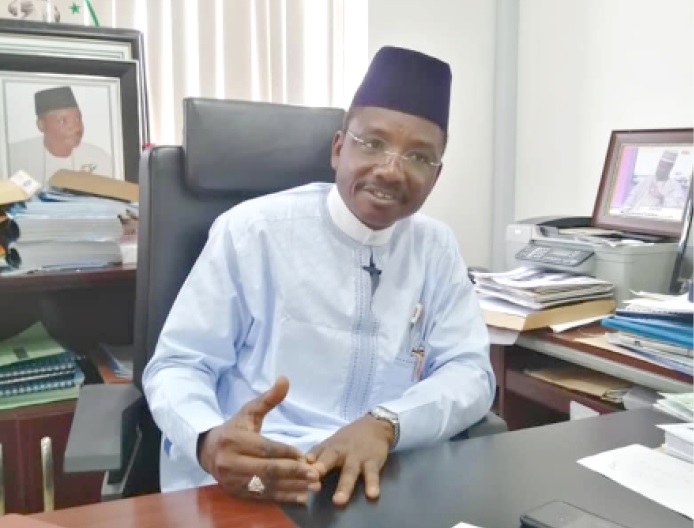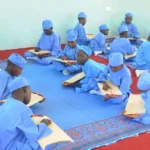Director General of the National Directorate of Employment, Nasir Ladan, Mohammed Argungu, in this interview, expressed confidence that President Muhammadu Buhari can take 100 million Nigerians out of poverty and sustain peace and national development. He also said the NDE has trained 1,019,653 unemployed people in two and a half years through entrepreneurial skills development.
How far has NDE gone in curbing unemployment?
The issue of unemployment is a global phenomenon not just Nigeria’s. I can remember the World Bank saying, for us to be comfortable as far as job creation is concerned, we need to create about 600 million jobs every year. globally.
In Nigeria, our level of unemployment or rate of unemployment based on what the statistician of the federation said, is between 17% – 23% and in a country of about 200 million people, you can see that level of unemployment is enormous. But thank God, according to what he said, there are about 30 million small scale enterprises in this country. If each one of them can be encouraged to create one job, that means the issue of unemployment is solved.
But that notwithstanding, it’s not just the issue of unemployment, there is underemployment whereby your take-home pay is not good enough to take care of you and your family throughout the month.
If you look at the category of unemployed, there are people that are available to work and there are those that are available but are not ready to work. If you look at it, it is a combination of a lot of factors; the issue of unemployment is multifactorial. A lot needs to be done.
In terms of what we achieved, virtually I’ve spent about two and a half years in NDE. In 2014, 2015, 2016 and early part of 2017, only about 14, 082 Nigerians were trained during this period.
When we took over, on April 18, 2017 and up to date, the total number of unemployed people that we have trained is 1,019, 653. And we achieved this using the same budget as that of 2014, 2015 and 2016. With the same budget we were able to train that number.
So, the training is demand-driven. Once we do that we know they’re hot cake and they will have something to do. So we reduced the trades from 80 to about just 15. One other thing is that we tried as much as we can to eliminate the use of consultancy. Anywhere they want to steal, consultants will always come in because in that field any amount of money can be buried and cannot be traced.
So, I have members of staff that have spent a greater part of their lives in NDE, some more than 30 years. So what can a young person who recently graduated tell them as far as employment generation is concerned? I tried as much as I could to use my staff and the amount of money we were able to save by eliminating consultancy is enormous, and that helped us to add to what we have and that is why we have this large number of trainees that we’re able to resettle.
One thing we realised is that if you train somebody in a trade, after they graduate, if you don’t give them working tools, or start-up packs, you have wasted your time and also his/her time. That’s why we’ll lay emphasis, especially come 2020, in resettling those trained.
And that is another way of monitoring them; by the time we stop seeing your products, we definitely ask questions, “Why are we not seeing your products?”
How do you source funds for training?
We train on a monthly basis. There is money meant for trainers fees and trainees fees, this money is disbursed on a monthly basis; we call it Non-Regular Capital, coming directly from the federal government.
The President has this plan of alleviating over 100 million out of poverty, what is the NDE doing about it, are you part of the plan?
We’re part of it, and from our plan, there is what we call (MEES) Micro Economic Enhancement Scheme, a program whereby we go to the grassroots. When you go to the villages, you’ll realize that most of our mothers, their capital is not more than N5,000. We go to the villages and get these people with existing businesses and some with the potential business but they don’t have the capital to start up.
For example, we can go to, a village and pick 20 women, those selling kunun zaki, zobo, akara and the rest of them, whose capital is not more than N5,000 and give each one of them N10,000 interest free loan to add up to their businesses. When we give 20 people we pick about five people immediately and attach them. When they pay, others will benefit. We don’t need to send out our loan officers, the fact is that those people awaiting their turn, will pursue them to pay so that they too can benefit.
We normally give them two months resting period before they start paying and the payment is just about N833 per month; some even pay complete within 2 to 3 months. So if you look at this, they are supposed to pay in one year and its revolving; averagely 5,000 per state. By the time you multiply 5,000 by 37 it equals to 185,000 people benefitting, nationwide.
By the time they start paying, you multiply 185,000 by 833 it is going to give you about 15,314,000 or so. If you divide that by 10,000 for other people to benefit, on a monthly basis about 4,116 Nigerians are benefitting, multiply that by a year, multiply by 10 years. So, on MEES alone, our contribution runs into millions. So as far as what Mr. President said of taking 100 million people out of poverty, that is on MEES alone from NDE.
If you look at our agricultural interventions, that is because we believe agriculture and ICT are areas where you can create millions of jobs because of their value chains. In agriculture we target mainly commercial or economic trees; you can start with 10 people and before you realise it, it is in multiple of factors just like the MEES from 10 to maybe 20, 30, 40. In the South, we realised it involves just N100,000 for an individual to hire land of 100 hectares, clearing, planting up to cultivation and the profit margin is between N120,000 to N150,000.
By the time you have 100 young men and women in a state and give them that, at least 100 hectares have been cultivated. They return your money to you after cultivation and you give it to other group of people because whatever we are doing, we are doing it in form of revolving fund. Maybe we start with 10 in a state but before you realise it, it has turned to 100, to 1,000 to maybe 10, 000 and the number keeps rising because the money is there, we are not taking it back.
The issue of taking 100 million people out of poverty in ten years is achievable. I just gave you the NDE perspective, if you take other agencies like SMEDAN, ITF and, what the vice president is doing, the Market Money (Tradamoni), it is achievable.
What is the least amount NDE gives as soft loan and what is the highest loan it can give? Already you’ve mentioned the people you’re targeting, how much?
It depends on what you’re doing, somebody that is trained on interlocks, block molding, whatever you’re going to give him will not be the same with what you’ll give the person you trains on confectionaries, maybe to establish his bread-making factory; or somebody that is trained on barbing or fashion design and the rest of them. It depends on what you want to do.
Recently, the diaspora commission came with some South Africa returnees and there was a lady who is a widow with four children and I asked her exactly what she wanted to do, she said she wanted to go into buying and selling, especially if she can have her own shop and be linked to some multinationals. But then even if you’re linked to them, you must commit yourself financially before they start giving you things.
So we gave her a loan of N1,500,000. The amount of money we give depends on what you want to do but to be frank with you; unlike in the past when loans were given, some people even deposited the original copies of their credentials but disappeared. You pursue them and they’ll tell you they don’t know what they’re supposed to pay. Now we make it watertight before you access it, we have to send our team to where you want to establish whatever business you want to establish, they look at it, if it is viable and they will give you what is called Basic Business Training.

 Join Daily Trust WhatsApp Community For Quick Access To News and Happenings Around You.
Join Daily Trust WhatsApp Community For Quick Access To News and Happenings Around You.

